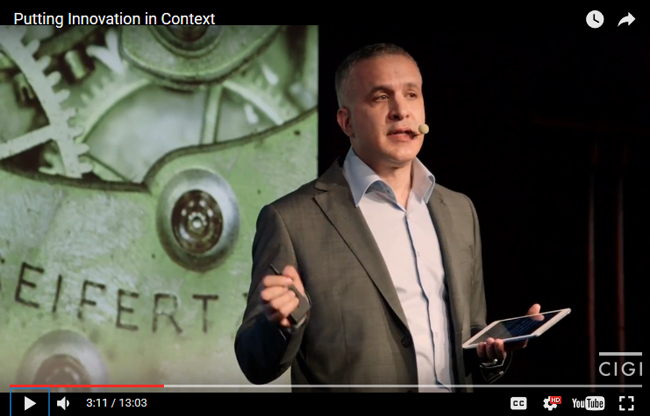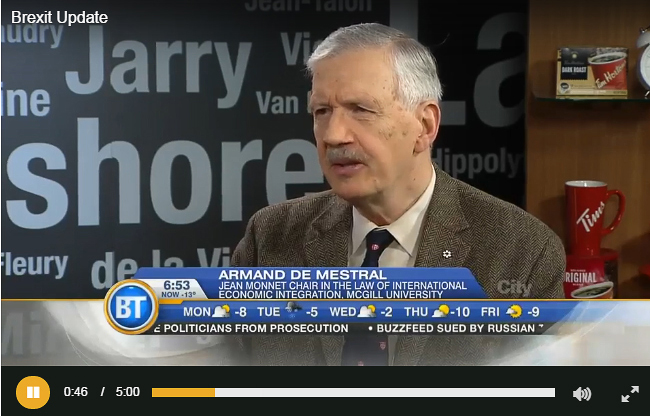In our March round-up, Armand de Mestral, François Crépeau and Frédéric Mégret are interviewed in the media; Payam Akhavan, Allison Christians, Kun Fan, René Provost, Ron Niezen and Cassandra Steer share some recent scholarship and opeds; and Richard Gold talks about innovation.
Opinion: International Women’s Day and Canada’s First Nations
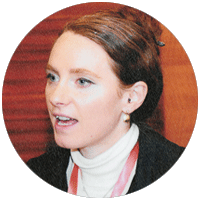 Cassandra Steer, Wainwright Fellow, Montreal Gazette, 6 March 2017
Cassandra Steer, Wainwright Fellow, Montreal Gazette, 6 March 2017
It’s easy to think of the violence perpetrated against indigenous women and girls as a problem for indigenous communities. What’s more of a challenge is recognizing the roles that the wider society and shared history play in the existence of this violence. As a citizen of Quebec, it is indeed part of my history, and at a time when racism, sexism and fear have become focal points in the media, it’s important to stand together with Quebec’s First Nations.
To this end, on March 8, International Women’s Day, all Montrealers are invited to take part in an important and timely conversation at McGill’s Faculty of Law where, among other activities, a panel discussion will address issues related to the National Inquiry into Missing and Murdered Indigenous Women and Girls. Keep reading…
Beyond the Huddled Masses [Audio]
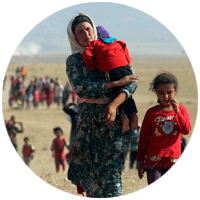 CBC Ideas, 2 March 2017
CBC Ideas, 2 March 2017
We’re all the product of our past. Where we come from, and how we got here from there, shapes who we are — our education, what kind of parents we had, our cultural background — these are just some of the factors that go into shaping the people we become as adults. But refugees bring something different into the mix.
From the 2016 Stratford Festival, a discussion with Payam Akhavan, Flora Terah and Harold Hongju Koh, three fighters for human rights, three people whose families arrived on the shores of North America with next to nothing. In the episode, Payam Akhavan talks about how the violence his family experienced in Iran has shaped his career in social justice and human rights. Listen to the episode…
Some Recent Scholarship on Tax and Human Rights
Allison Christians, Tax, Society & Culture blog, 28 February 2017
Professor Allison Christians has been working intensively on questions at the intersection of human rights and tax law. She recently shared three articles she posted on SSRN: Human Rights at the Borders of Tax Sovereignty; Taxpayer Rights in Canada; and Taxpayer Rights in the United States.
You can find out more on her blog, and you can also engage with her about her scholarship at @taxpolblog.
FARC Justice: Rebel Rule of Law
 René Provost, SSRN, 24 February 2017
René Provost, SSRN, 24 February 2017
In the more than half-century of civil strife in Colombia, there has been a constant ebb and flow in the sharing of power between the Government and rebel groups, the largest of which is the Fuerzas Armadas Revolucionarias de Colombia – Ejército del Pueblo (FARC). The FARC is a highly structured group controlled by a designated hierarchy…
One facet of this rebel governance has been the administration of justice. It appears that FARC judicial institutions grew out of internal disciplinary mechanisms, commonly established by non-state armed groups to ensure tactical effectiveness. The paper, relying on recent ethnographic research by anthropologists and sociologists in Colombia as well as my own field work, will map out the emergence and evolution of these FARC ‘courts’ with a view to appraise the extent to which they correspond in any meaningful manner to the concept of the judicial function. This will in turn serve to interrogate, relying on the insights of legal pluralism, the concept of the rule of law that is embodied in international legal instruments in the fields of international human rights and international humanitarian law. Keep reading…
Fourth Annual China Law Conference
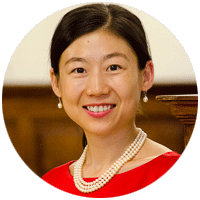 University of Toronto, 18 February 2017
University of Toronto, 18 February 2017
Professor Kun Fan spoke at the Fourth Annual China Law Conference at the University of Toronto. At the conference, a group of Chinese law experts discussed the themes of Political Environment of China’s Legal Reforms, Business Law in the Chinese Context, and the Rule of Law in China.
Professor Fan used the example of China to illustrate her theory of “glocalization” of arbitration, and argued that the alleged process of Westernization – or Americanization – of arbitration should be re-cast as a hybrid process of “glocalization”, which reflects combined influences of ‘global standards’ and ‘local norms’.
The China Law Conference is a one-day conference on issues of Chinese law and Canada-China relations, bringing together scholars and practitioners from around the world to create a forum for advancing Canadian students’ understanding of the challenges and opportunities created by the rise of China.
Migration lässt sich nicht stoppen, nur kontrollieren
Berner Zeitung, 17 February 2017
Professor François Crépeau was interviewed in February by a newspaper in Bern, in which he comments on Switzerland’s migrant policies: ‘migration cannot be stopped, just controlled’. In German. Keep reading…
We Need a Trade Pact for All North Atlantic Countries
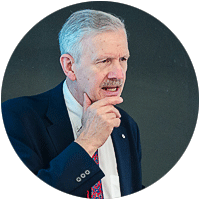 Armand de Mestral, CIGI online, 16 February 2017
Armand de Mestral, CIGI online, 16 February 2017
The Canada-EU trade deal has been approved. Is that it? Or can Trudeau be more ambitious?
A warm welcome in Strasbourg for the first Canadian leader to address the European Parliament is a fitting way to mark the approval this week of a pact that was — for fleeting moments — thought to be in peril.
The Canada-European Union Comprehensive Economic and Trade Agreement (CETA) is a remarkable achievement and reflects the confidence of leaders in both Ottawa and Brussels that a well thought-out free trade agreement will bring benefits to their respective peoples. It serves as a powerful counterpoint to the pervasive pessimism of the times, and suggests that the forces of global economic integration are, if not inexorable, likely to endure passing political theatrics. Keep reading…
The Future of Anthropology of Law
PoLAR, 10 February 2017
 Professor Ronald Niezen contributed his thoughts to PoLAR: Political and Legal Anthropology Review’s Emergent Conversations, whose sixth theme focused on the futures of legal anthropology, recognizing the plurality of approaches to the anthropological study of law.
Professor Ronald Niezen contributed his thoughts to PoLAR: Political and Legal Anthropology Review’s Emergent Conversations, whose sixth theme focused on the futures of legal anthropology, recognizing the plurality of approaches to the anthropological study of law.
“… I see the anthropology of law from two perspectives, one (from anthropology) centered on a critical approach to law, the other (from law) an applied approach to the tools of anthropology oriented toward making social science contributions to legal process. My understanding of the contemporary state of legal anthropology is that these two approaches are fairly widespread, and form very different, often irreconcilable bodies of literature, even though they sometimes involve the same actors and overlap in many places” Keep reading…
Putting Innovation in Context
Richard Gold, CIGI online, 8 February 2017
From Gutenberg’s printing press to anaesthesia, what do the world’s greatest innovation have in common? Technology and commitment to excellence perhaps, but Professor Richard Gold says innovations are so much more than the products and services we end up with.
In this talk, Gold explains why people are what is integral to true innovation and how we can foster and better leverage a culture of innovative thinking. Drawing from examples throughout history, Gold tells the rich story of how human beings are equipped to creatively solve problems and why technology is neither sufficient or necessary for innovation to occur. Watch his talk… (13 minutes)
Canada must act now to get international justice in Syria
 Payam Akhavan and Alex Neve, The Globe and Mail, 7 February 2017
Payam Akhavan and Alex Neve, The Globe and Mail, 7 February 2017
It has been nearly two months since Syrian President Bashar al-Assad’s forces captured the besieged city of Aleppo, with support from Russia and Iran, wreaking carnage upon the civilian population and thrusting the Syrian crisis back onto the front pages of newspapers.
Attempts to give victims of these atrocities some measure of justice have repeatedly failed. Efforts by the United Nations Security Council to refer Syria to the International Criminal Court (ICC) have been blocked by Russia’s veto power. But the question of accountability remains a vital ingredient of any lasting peace. Eradicating a culture of impunity remains a central challenge, especially for Canada’s moral leadership on the world stage. Keep reading…
Brexit update
Montreal Breakfast Television, 6 February 2017
In this interview, Professor emeritus Armand de Mestral, who holds the Jean Monnet Chair in Law of International Economic Integration at McGill University, and who had just returned from Britain, offered his insights into the latest plans for BREXIT, discussing how the latest White Paper on the matter is unlikely to appease critics. Watch the interview… (5 minutes)
La politique d’immigration du président Trump [Audio]
 ICI Radio-Canada International, 4 février 2017
ICI Radio-Canada International, 4 février 2017
Conformément à ses promesses de campagne électorale, le président Trump a adopté plusieurs décrets visant à limiter l’arrivée de réfugiés aux États-Unis et à lutter contre les immigrants illégaux présents sur le sol américain. Par ailleurs, un juge de Seattle a ordonné la suspension, au niveau national, du décret qui interdisait temporairement l’entrée sur le territoire des États-Unis aux ressortissants de sept pays.
Arnaud Decroix a discuté des arguments juridiques de cette décision judiciaire et de la notion de discrimination avec Frédéric Mégret, professeur de droit international à l’Université McGill. Écoutez l’entrevue… (23 minutes)
Complementarity Conundrums: The ICC Clock in Transitional Times
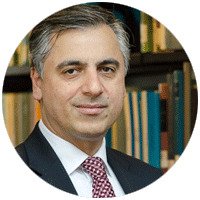 Payam Akhavan, Journal of International Criminal Justice, December 2016
Payam Akhavan, Journal of International Criminal Justice, December 2016
How can the temporal realities of transitional justice be reconciled with the requirement of finality in International Criminal Court (ICC) admissibility proceedings? The ICC clock tends to run too fast for states emerging from mass atrocities. The admissibility challenges of Libya in the cases of Saif Al-Islam Gaddafi and Abdullah Al-Senussi illustrate the realities of reconciling immediate global justice with the imperatives of local justice following mass atrocity. Striking the right balance between time and justice is at the root of an effective system of complementarity.
The Libya cases provide an important precedent because it presents a post-conflict situation with actual national proceedings and a genuine willingness to prosecute. As such, it addresses the extent to which the ICC should accommodate the time and resource constraints of national judicial systems in transitional situations. Instead of a rush to judgment, making the complementarity principle a practical reality requires meaningful engagement with the messy realities of post-conflict justice. Keep reading…

